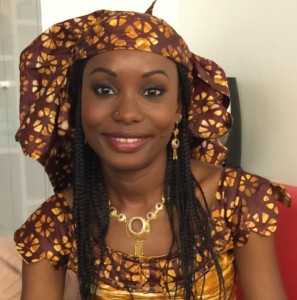Power to Empower: Hindou Oumarou Ibrahim Brings Indigenous Perspective to the International Stage
 November 2020 – Hindou Oumarou Ibrahim is an expert on both indigenous peoples’ rights and sustainability change. She is part of the indigenous Mbororo people and President of the Association for Indigenous Women and Peoples of Chad (AFPAT). Throughout Hindou’s career, she has worked to empower indigenous communities via advocating for the incorporation of indigenous knowledge into global discussions about sustainability change. Hindou spoke with Vital Voices President and CEO Alyse Nelson about the inextricable role of indigenous knowledge in our collective building of a sustainable world.
November 2020 – Hindou Oumarou Ibrahim is an expert on both indigenous peoples’ rights and sustainability change. She is part of the indigenous Mbororo people and President of the Association for Indigenous Women and Peoples of Chad (AFPAT). Throughout Hindou’s career, she has worked to empower indigenous communities via advocating for the incorporation of indigenous knowledge into global discussions about sustainability change. Hindou spoke with Vital Voices President and CEO Alyse Nelson about the inextricable role of indigenous knowledge in our collective building of a sustainable world.
In their informative conversation, we learn that pastoral communities, dependent on rainfall and agriculture, bear the brunt of sustainability change when reduced rainfall and longer dry seasons make land less livable. In this way, global warming attacks more than the environment; according to Hindou, it attacks the “human dignity” of indigenous communities. Indigenous people, who she describes as “guardians of nature”, have inimitable knowledge of how to best preserve wildlife, agriculture, and ecosystems. Still, this knowledge and direct experience of sustainability change is often excluded in the global development sector and from the international conversations that dictate worldwide sustainability efforts. Hindou leads through challenging the paradox that exists while pursuing indigenous and environmental rights. She explains that while sustainable solutions to sustainability change are impossible to formulate without indigenous perspectives, so many aspects of being indigenous—from clothing, to language, to educational background—are used to reduce the credibility of indigenous knowledge. This discrediting happens even more so when the knowledge is coming from an indigenous woman.
Through Hindou’s incredible story, we learn that shifting this paradigm is crucial to slowing the effects of sustainability change and is necessary in establishing the rights of indigenous people. In translating her lived experiences to those in power, as she did at the 2016 Paris Climate Agreement signing, Hindou empowers indigenous communities and their specialized knowledge. Her inspiring mission is one that supports collaborating with nature to ensure a successful future, stating that “if we protect nature, nature will protect us back”.
This podcast series is inspired by the Vital Voices: 100 Women Using their Power to Empower – edited by Alyse Nelson with artwork by Gayle Kabaker and published by Assouline.
Listen to her episode here:
This post was written by Annalysse Mason.